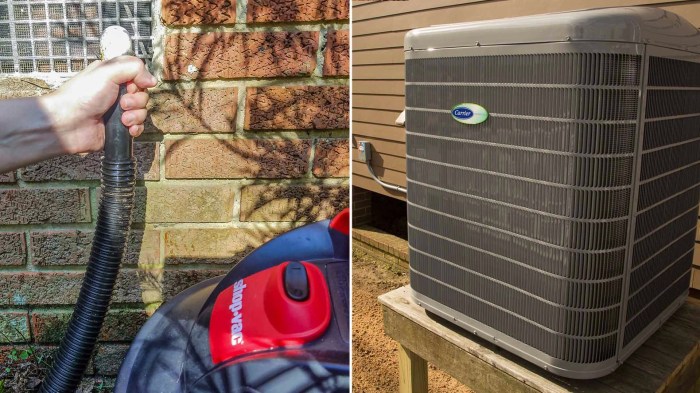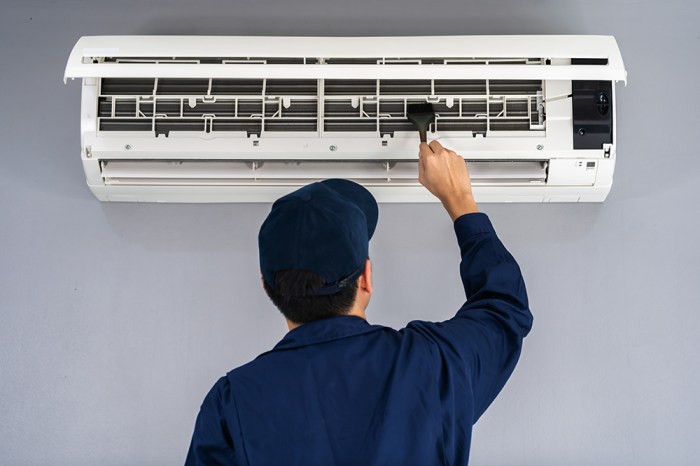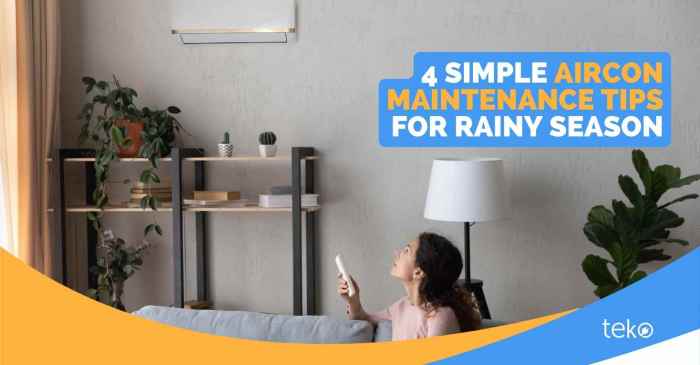Tips for maintaining air conditioner during rainy season: Essential maintenance tips delves into the importance of caring for your AC unit when the weather turns wet, offering practical advice and insights for optimal performance. From cleaning air filters to protecting the outdoor unit, this guide covers it all to ensure your air conditioner stays in top shape during the rainy season.
Importance of maintenance
Regular maintenance of an air conditioner during the rainy season is crucial for ensuring optimal performance and longevity of the unit. Neglecting maintenance can lead to a host of problems that can impact both the efficiency of the air conditioner and the quality of air in your home.
Potential Risks of Neglecting Maintenance
- Accumulation of dirt and debris: Without regular cleaning, dirt and debris can build up in the air conditioner, causing clogs and reducing airflow.
- Increased energy consumption: A dirty or clogged air conditioner has to work harder to cool the air, leading to higher energy bills.
- Reduced cooling capacity: Neglected air conditioners may struggle to maintain the desired temperature, resulting in discomfort during hot and humid days.
- Malfunctioning components: Lack of maintenance can cause various components of the air conditioner to wear out faster, leading to costly repairs or replacements.
Benefits of Regular Maintenance, Tips for maintaining air conditioner during rainy season
- Improved efficiency: Regular maintenance, such as cleaning filters and coils, can help the air conditioner operate more efficiently, saving energy and reducing utility costs.
- Extended lifespan: By addressing minor issues promptly and keeping the unit clean, regular maintenance can extend the lifespan of the air conditioner, delaying the need for a replacement.
- Better air quality: Clean filters and coils can improve indoor air quality by reducing dust, allergens, and pollutants circulating in the air.
- Preventative measures: Routine maintenance allows HVAC professionals to identify potential problems early on and address them before they escalate into major issues.
Cleaning the air filters

Regular cleaning of air filters is crucial for maintaining the efficiency and performance of your air conditioner. Clogged or dirty filters can restrict airflow, reducing the cooling capacity of the unit and leading to higher energy consumption. Additionally, dirty filters can also result in poor indoor air quality, as they may not effectively filter out dust, pollen, and other allergens.
Importance of cleaning air filters regularly
- Improves air quality: Clean filters ensure that the air circulating in your home is free from dust, pollen, and other pollutants.
- Enhances efficiency: Properly cleaned filters allow for better airflow, reducing strain on the system and improving energy efficiency.
- Extends lifespan: Regular maintenance helps prevent breakdowns and extends the lifespan of your air conditioner.
Steps to clean air filters effectively
- Turn off the air conditioner: Before starting the cleaning process, make sure to turn off the unit to avoid any accidents.
- Locate the air filters: Air filters are typically located behind the front grille or within the air handler unit. Refer to the manufacturer’s manual for guidance.
- Remove the filters: Carefully take out the filters from their housing, being cautious not to damage them.
- Vacuum or wash the filters: Depending on the type of filter, you can either vacuum it or wash it with water and mild detergent. Let the filters dry completely before reinstalling.
- Reinstall the filters: Once the filters are clean and dry, place them back in the unit securely.
Impact of clean air filters on AC efficiency
Clean air filters play a significant role in the efficiency of your air conditioner. By allowing proper airflow, clean filters help the system operate smoothly and maintain the desired temperature in your home. This, in turn, reduces energy consumption, lowers utility bills, and extends the lifespan of the unit.
Checking for leaks and drainage: Tips For Maintaining Air Conditioner During Rainy Season

It is essential to regularly check for leaks and ensure proper drainage in your air conditioner to maintain its efficiency and prevent potential damage.
When it comes to AC maintenance, there are common mistakes that people often make, leading to inefficiency and potential damage. To avoid these issues, it’s essential to be aware of the common mistakes to avoid in AC maintenance. Additionally, cleaning AC ducts is crucial for optimal performance.
A comprehensive guide to cleaning AC ducts can help ensure proper airflow and air quality. For those looking to do it themselves, following the correct steps for a DIY air conditioner tune-up is key. Check out this resource on DIY air conditioner tune-up steps for a smoother-running AC unit.
Inspection Process
Here is a detailed process to inspect the unit for leaks and ensure proper drainage:
- Check the condensate line for any visible leaks or blockages. This line is responsible for draining excess moisture from the air conditioner.
- Inspect the unit’s evaporator coil for any signs of leakage, such as water pooling around the coil.
- Make sure the condensate pan is clean and free of debris to allow proper drainage of water.
- Examine the area around the air conditioner for any water puddles or damp spots, indicating a potential leak.
- If you notice any leaks or drainage issues, it is crucial to address them promptly to prevent further damage to the unit.
Consequences of Ignoring Issues
Ignoring leaks and drainage problems in an air conditioner can lead to various consequences:
- Water damage to the unit and surrounding areas, resulting in costly repairs.
- Reduced cooling efficiency and performance due to restricted airflow caused by clogged drains.
- Potential mold and mildew growth in the unit, posing health risks to occupants.
- Shortened lifespan of the air conditioner due to prolonged exposure to moisture and corrosion.
Protecting the outdoor unit
During the rainy season, it is crucial to take steps to protect the outdoor unit of your air conditioner. This will help ensure that the unit functions optimally and remains in good condition for an extended period.
Keeping the outdoor unit clean and free from debris
- Regularly inspect the outdoor unit for any accumulation of leaves, dirt, or debris that may obstruct airflow.
- Clean the unit with a soft brush or cloth to remove any build-up and ensure proper ventilation.
- Trim any vegetation or plants near the outdoor unit to prevent leaves and debris from falling into it.
- Ensure that the area around the unit is clear to allow for adequate air circulation.
Guidance on covering or sheltering the outdoor unit
- Consider using a cover specifically designed for air conditioner units to protect it from rain and debris.
- Ensure that the cover is breathable to prevent moisture buildup inside the unit.
- If you do not have a cover, you can use a piece of plywood or tarp to shield the unit from direct exposure to rain.
- Make sure that the cover or shelter does not obstruct airflow or ventilation around the unit.
Professional maintenance
Scheduling professional maintenance for air conditioners is crucial to ensure the optimal performance and longevity of the unit. While regular cleaning and maintenance tasks can be done by homeowners, hiring a professional for thorough inspection and servicing can provide several benefits.
Benefits of hiring a professional
- Expertise: Professionals have the knowledge and experience to identify potential issues that may go unnoticed by homeowners.
- Efficiency: Professional maintenance can help improve the efficiency of the air conditioner, leading to lower energy bills.
- Preventive maintenance: Regular professional servicing can help prevent major breakdowns and costly repairs in the future.
- Warranty protection: Some manufacturers require professional maintenance to keep the warranty valid.
When to seek professional help
- Annual servicing: It is recommended to schedule professional maintenance at least once a year to ensure the air conditioner is in optimal condition.
- Unusual noises or odors: If you notice strange sounds or smells coming from the air conditioner, it is best to seek professional help to diagnose and fix the issue.
- Poor cooling performance: If the air conditioner is not cooling the space effectively, a professional inspection can help identify the underlying problem.
- Frequent breakdowns: If the air conditioner is experiencing frequent breakdowns, it may be a sign that professional maintenance is needed to address underlying issues.
Last Word

In conclusion, following these maintenance tips can help you avoid costly repairs and ensure your air conditioner functions efficiently throughout the rainy season. By taking proactive measures and scheduling professional maintenance when needed, you can extend the lifespan of your AC unit and enjoy cool, comfortable air year-round.
When it comes to AC maintenance, there are common mistakes that should be avoided to ensure optimal performance. One of the most crucial aspects is the regular cleaning of AC ducts to prevent blockages and improve air quality indoors. For a DIY approach, following the proper air conditioner tune-up steps is essential to keep your unit running smoothly.
Learn more about common mistakes to avoid in AC maintenance , guide to cleaning AC ducts , and DIY air conditioner tune-up steps for a well-maintained cooling system.